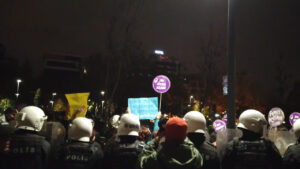Robin Fleming
On the 25th of November, the Day of Elimination of Violence Against Women, protests were held in Istanbul. These protests resulted in the brutalization and detaining of 200 women by Turkish police, with one woman enduring a broken leg. At the same time across the border in North and East Syria (NES), Turkish artillery and warplanes are striking necessary infrastructure and killing civilians. These two events should not be looked at in isolation, as they couldn’t be more connected.
Two days later, on the 27th, footage was released by JinNews showing evidence of systematic rape and torture of a women being held in a Turkish prison. Her name was Garibe Gezer, and she was a Kurdish political prisoner until she lost her life in her prison cell under suspicious circumstances in December 2021.

Women protest against violence against women in Istanbul despite being banned from doing so. During the protests women expressed solidarity with the women’s revolt in Iran, and condemned Turkey’s attack on the women’s revolution in North East Syria.
The protesters in Istanbul expressed solidarity with the women’s revolt in Iran utilizing the slogan Jin, Jiyan, Azadi (translated to women, life, freedom) and also loudly condemned Turkey’s attacks on NES. Turkish police attempted to prevent the women from using the Kurdish feminist slogan, and successfully prevented a banner which read – “From Afghanistan to Iran, from Iran to Kurdistan, from Kurdistan to Turkey, the feminist fire will not go out!” from being taken into the demonstration.
Turkish repression of women could not be more clear in the case of this protest. It is bitterly ironic to see the police’s violence against women on the very day women rally against violence, and unsurprising to see Turkish military use violence against a region known for its women’s revolution, and project of direct democracy at the same time.
What is it about women organizing and demanding their rights that terrifies Turkey so much? Why is it that Turkey always claims to feel threatened by the autonomous, pro-woman, pro-democracy region south of its border?
The answer lies within the question itself.
It is because Turkey is afraid of movements and people, even banners and slogans which pose an alternative to their deeply authoritarian, nationalist and sexist approach to governance. The very existence of a project like the Autonomous Administration of North and East Syria (AANES) frightens Turkish President Erdoğan not because it poses any military threat to Turkey what-so-ever, but because he fears the values and principles which it stands for.
Therefore, it has become the duty of everyone who shares these principles of democracy, women’s rights and religious and ethnic tolerance to support the political project of NES and condemn the threatened Turkish incursion. But it is not only a matter of principle, any attack on NES will certainly setback all the progress that has been made in this region.
We have already seen this being actualized since Turkey started its aerial attacks on NES on the 19th of November. With ISIS-affiliates attempting escape from al-Hol camp in the region of Heseke, following the chaos of Turkish attacks. Concern about the threat of ISIS is shared by many.

NES houses thousands of ISIS affiliates and militants in camps and prisons. A Turkish attack on the region runs the risk of these prisoners escaping.
Dr. Eric R. Mandel, director of the Middle East Political Information Network (MEPIN) has said that US President Biden refraining from intervening with Turkish attacks – “would be a mistake, as a resurgent ISIS would call the US back to a far more chaotic Middle East”. Terrorism expert Munir Edib said that the main purpose of the Turkish state’s latest military attacks against the SDF is to resurrect ISIS and pave the way for it to create chaos in prisons and camps according to a Medya News report. John Kirby of the United States (US) National Security Council said that the US ‘does not want to see any actions that would harm efforts to continue to work with Syrian counterparts against ISIS.’ And US Defence Secretary Lloyd Austin said that Turkish strikes have ‘directly threatened the safety of US personnel’ in their efforts to fight ISIS.
There is real concern about a re-emergence of ISIS in the case of a full-scale invasion. Why does Turkey not share this concern, with its supposed NATO ally – the United States? Why does a country which claims to be fighting terrorism seem more concerned with attacking the US’s ally in the fight against ISIS than it is with ISIS itself? Once again, the answer to these questions aren’t hard to find. Apparently the violently sexist, and terror approach of the Islamic state are more compatible with the Turkish government than NES’ principles of direct democracy and women’s rights. Think back to what the Turkish prison system did to Garibe Gezer, and what ISIS did to their own captives.
Now it’s time for everyone watching this situation unfold to ask themselves whose side are you on? And for all those who align themselves with democratic and feminists’ movements to see it as their duty to speak out against Turkey’s invasion and organize themselves in solidarity with the women’s revolution in NES, and cry out against Turkey’s violence against women within its own country and across its borders. Do this not only for the people of NES but also for yourselves.
Remember the words of American feminist and author Audra Lorde –
“I am not free while any woman is unfree, even when her shackles are very different from my own.”
- Robin Fleming is an American Researcher who worked with the Rojava Information Center and specializes in North East Syria.










